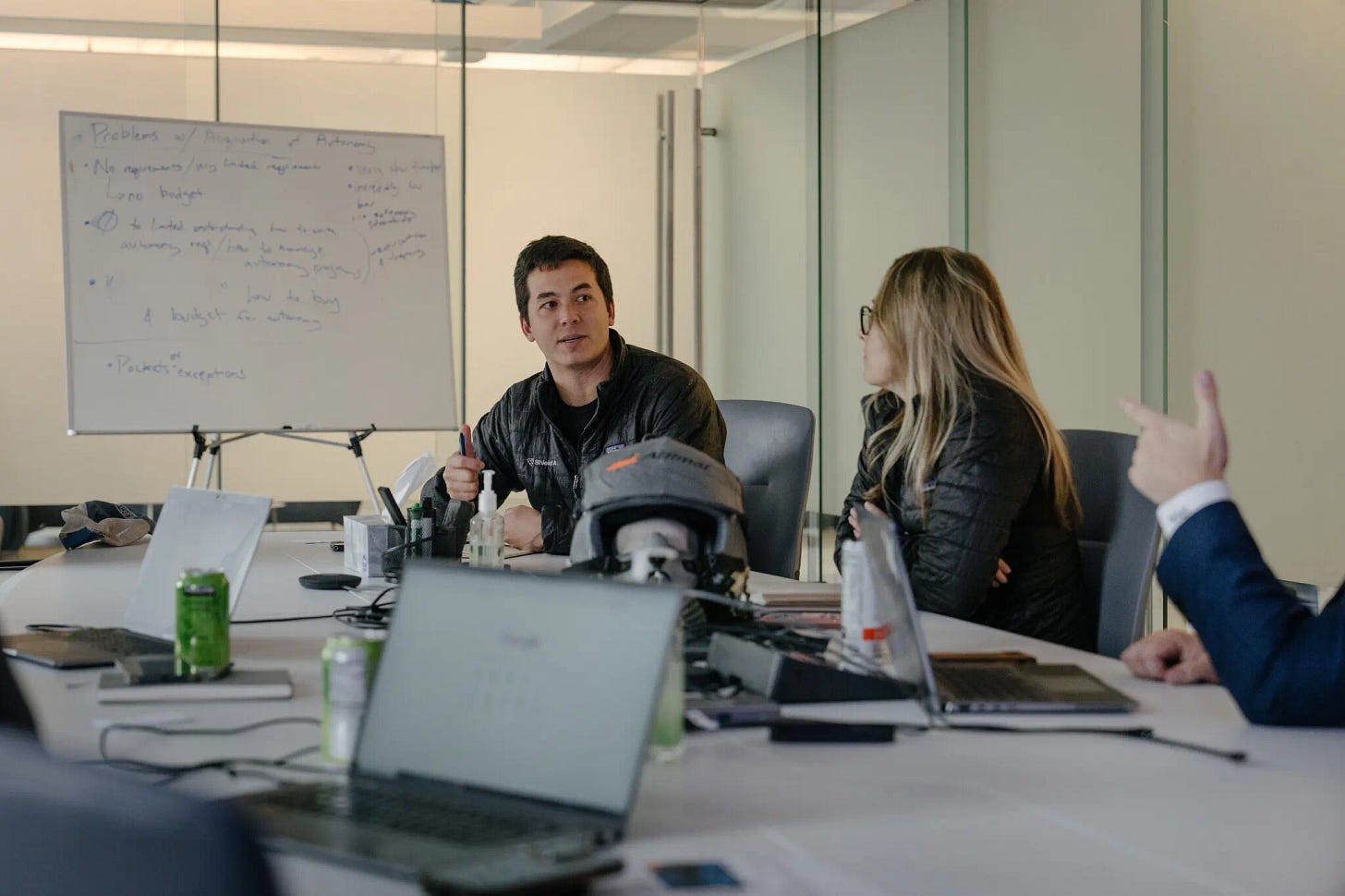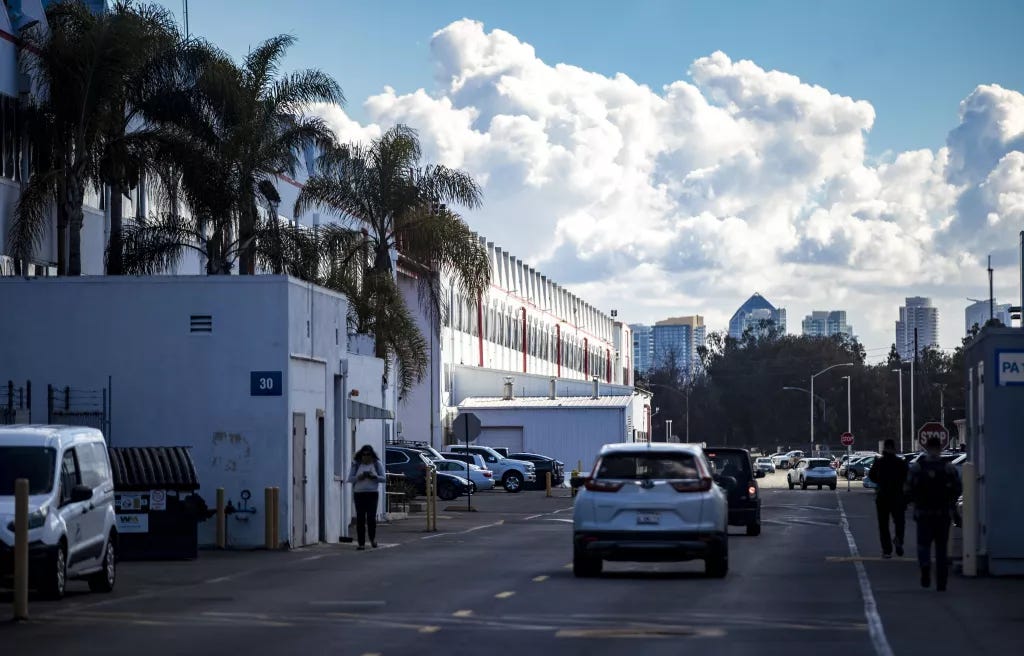Shield AI's Founders: Talk Scaling Tech Startup in San Diego, Valued at $2.7 Billion
CEO and Co-Founder discuss its $200M Raise, Hiring Efforts and Scaling in S.D.
Learn from San Diego's top entrepreneurs and companies. Every week, I write a newsletter breaking down the business and money in San Diego. Join 1,000+ San Diego tech professionals, entrepreneurs, and investors by subscribing below.
Not many are surprised that Shield AI is among the most valuable defense tech startups founded over the last ten years.
The eight-year-old company, has just raised $200 million in Series F funding to scale its operations across the US and internationally.
The Series F round was led by Thomas Tull’s U.S. Innovative Technology Fund and co-led by Riot Ventures. Other notable investors including ARK Invest, Disruptive and Snowpoint also participated in the round.
Shield AI’s leadership team said its wants to become the “defining technology company of the 21st century,” and expects to bring in $165 million in revenue this year, up 90% from its revenue in 2022.
Lily Hinz, who leads executive communications at Shield AI, told me its leadership team is super busy around this time of year.
The co-founders were kind enough to do an exclusive interview discussing the early days scaling a unicorn startup in San Diego, pitching the company to investors in Silicon Valley, as well as growth plans for 2024.
This is the inside scoop of Shield AI’s founding and its goal to become SD’s next billion-dollar tech company.
Building in San Diego
This is not the first unicorn tech startup to start in San Diego. In 2004, Fred Luddy founded ServiceNow which has since moved its headquarters to Santa Clara, now valued at $120 billion. Other tech unicorn companies like Drata, Seismic and Tealium employ several hundred workers in the region also.
“San Diego is the place my brother Brandon (co-founder and President) called home after serving in the Navy as a surface warfare officer and SEAL,” said Ryan Tseng, co-founder and CEO of Shield AI. “It’s fitting to be in a city with such strong military ties.”
Shield AI’s goal is carve its own path, serving the department of defense (DoD) as well as its allies — an industry that annually pumps $50 billion-plus into the local economy.
“I don’t think there is a better place than here,” said Tseng, crediting the military town for playing a critical role in its success early on.
“Shield AI was founded to bring the best of AI and autonomy technology to the DoD and our allies to protect service members and civilians,” he said. “So what better place to do that than the city with such a significant military footprint?”
Pitching 30 Silicon Valley Investors
In August 2015, two brothers Brandon and Ryan Tseng teamed up with third co-founder Andrew Reiter to build a defense tech startup which now counts United States Special Operations Command, US Air Force, US Marine Corps, in its client base among other allied military organizations.
Tseng, who sold his first company to Qualcomm thirteen years ago, previously served as an engineering leader for the tech giant’s wireless charging business unit for 3 years. He knows the importance of intellectual property and how to sell a product to equipment manufacturers — an important strategy at Shield AI today.
I asked about how it landed its initial $100,000 seed investment for its friends and family round. “We scheduled 30 meetings with potential investors in Silicon Valley,” said Ryan Tseng, “Twenty-nine of them initially passed.”
Brandon Tseng, who served as a Navy Seal for 7 years, knew firsthand how the startup could provide an advantage on the battlefield. He is largely credited for coming up with the initial idea, according to the company.
Early investors who bet on Shield AI, not only wanted generous deal terms, but also wanted “outsize” returns, said Tseng. Which might help explain why there is a growing trend of investment dollars flowing into the defense tech space.

Spending Time and Money in Congress
“We are also fortunate to work with congressional delegation and civic leaders that believe in and support our mission,” said Tseng, who is increasingly spending more time in Washington, D.C., near Capitol Hill.
Shield AI’s lobbying presence in Washington has grown significantly — it hired Chip Burkhalter, a former State Department official who leads Shield AI’s government relations, Burkhaler helped create Shield AI’s first in-house lobbying team in 2021.
Shield AI is a brand name in Silicon Valley, which seems to have happened almost overnight — thanks to its military partnerships and growing involvement in government politics — landing major news headlines in the New York Times, Bloomberg, and Wall Street Journal.
Shield AI has reportedly spent $1 million-plus on lobbying efforts aimed at the Pentagon, Congress and the administration.
The Great Race for Defense Tech
To succeed in this sector, startups are investing expensive multi-year projects, to develop sophisticated defense systems, which can often bring long timelines of winning contracts.
To earn the top spot, Shield AI will need to out-compete its competitors, specifically in the defense tech space which is being fueled by venture capital firms such as Founders Fund, Andreessen Horowitz, and Lux Capital, among others.
Anduril, a six-year-old startup valued $8.5 billion, says it’s also working to develop drones, missiles, submarines and border protection systems for U.S. agencies and allied governments. It recently told investors it plans to spend up to $2 billion in cash from 2021 to 2026, to hit its $1 billion target annual revenue goal.
While the road ahead isn’t glamorous as its $200 million fundraise, Shield AI has high confidence for the company’s future. It plans to grow its headcount by more than 100 additional staffers by the end of 2024.
“We are looking to grow the company from the current 625-person headcount to around 750 by the end of 2024,” he said. I then asked Tseng whether an IPO might be on the table going into next year.
He responded, “We keep the IPO timeframe in the back of our minds,” but noted that they are focused on growth, scale, and reducing operating costs.
“We are focused on continuing to build on our growth and scale while also making sure we are operationally effective and efficient,” he said. “We aim to execute our strategy of developing the world's best AI pilot and to advance up the aviation industry's value chain through vertical integration and partnerships with original equipment manufacturers (OEMs).”








